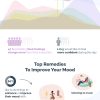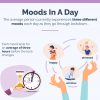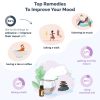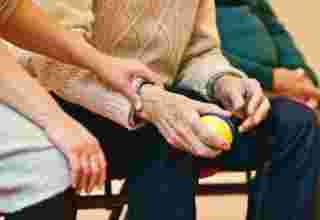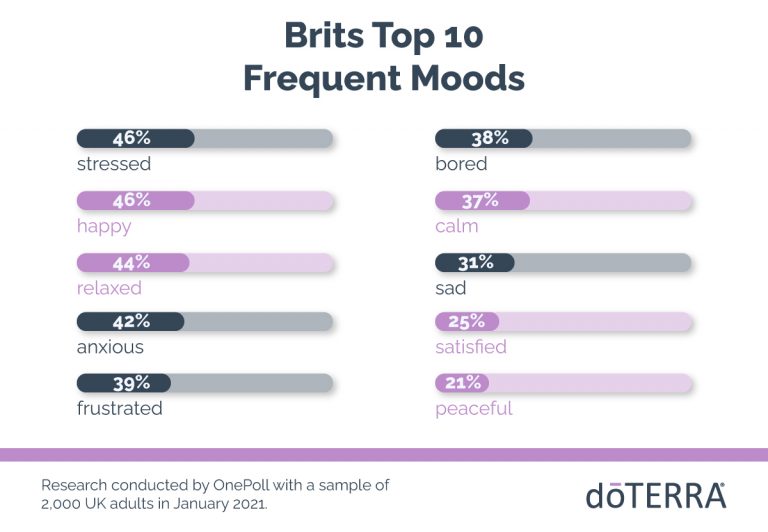
The average Brit currently experiences three different moods each day as they go through lockdown, with stressed, anxious and happy the most common.
The events of 2020 have had a significant impact on people’s moods, with almost half thinking more about their emotional wellbeing than usual.
But 39 per cent feel more stressed than they should, while more than four in 10 feel the mood in their household has changed for the worse since the pandemic began.
The study of 2,000 adults revealed half feel their moods follow the same pattern each day, with 38 per cent frequently feeling bored as the nation embarks on another lockdown.
Each mood lasts for an average of three hours before the tone changes, with 47 per cent admitting their feelings change more than they would like.
And happiness, calm and relaxed are the moods Brits would most like to find themselves in, while one in five long to feel more confident.
Kirk Jowers, Executive Vice President of doTERRA, a health and wellness company specialising in in essential oils which commissioned the research, said: “It’s only natural for people to feel a range of emotions throughout the day – especially with the lockdown causing such uncertainty at the moment.
“Our patterns, routines and activities can dictate how we feel, and naturally, the pandemic has altered many of our daily habits.
“In addition, work can bring its fair share of stress, while family and friends tend to impact us in a more positive way.
“We know that it’s vitally important to take time out for yourself and think about your wellbeing and the research shows people are very open to looking at ways to improve their moods.”
The study also found that the time of day impacts moods with the average Brit most likely to be feeling relaxed or sad in the morning hours before work, with the time leading up to lunch bringing feelings of stress.
Around lunchtime, the stressed mood continues, though an increasing amount of people find themselves in a happier state.
In the afternoon, stress levels rise again, while people are more excited and happier between the hours of four and six as they look forward to the evening.
Respondents said they’re at their happiest from 6-8 pm and the most relaxed from 8-10 pm.
Nearly six in 10 like to do things to enhance or improve their mood, with taking a walk, listening to music, or having a tea or coffee among the top remedies.
Others like to have a bath (31 per cent), get out into nature (37 per cent) or use essential oils (10 per cent) to improve their mood or relax.
It also emerged that although 68 per cent believe they’re more productive if they’re in a better mood, just 43 per cent are good at taking time out for themselves on a daily basis.
The research also found a person’s mood also impacts more than just their personal wellbeing with 62 per cent reporting they can impact other members of their family – and 37 per cent indicating their mood can impact their workplace.
Kirk Jowers from doTERRA added: “There is certainly an appetite among Brits to find ways to improve moods and how they feel.
“Now, more than ever, many are looking to take time for themselves and their families to relax.
“Of course, research shows that taking a bath or going for a walk are beneficial, yet there are some other wonderful and natural ways to relax.
“In such unprecedented times, and particularly in January, people need a bit of a mood boost, so using essential oils as part of daily routines, aromatherapy, massage, yoga and other health and wellness activities is something the entire family can do to improve emotional wellbeing and find balance.”
BRITS TOP 10 MOST FREQUENT MOODS
1. Stressed
2. Anxious
3. Happy
4. Relaxed
5. Calm
6. Frustrated
7. Bored
8. Sad
9. Satisfied
10. Peaceful
jQuery(document).ready(function($) {
// We only want these styles applied when javascript is enabled
$(‘.gal_content’).css(‘display’, ‘block’);
// Initialize Advanced Galleriffic Gallery
var gallery = $(‘#thumbs_44557_1’).galleriffic({
delay: 3500,
numThumbs: 12,
preloadAhead: 12,
enableTopPager: false,
enableBottomPager: false,
imageContainerSel: ‘#slideshow_44557_1’,
controlsContainerSel: ‘#controls_44557_1’,
captionContainerSel: ‘#caption_44557_1’,
loadingContainerSel: ‘#loading_44557_1’,
renderSSControls: true,
renderNavControls: false,
playLinkText: ‘Play Slideshow’,
pauseLinkText: ‘Pause Slideshow’,
enableHistory: 0,
autoStart: 0,
enableKeyboardNavigation: true,
syncTransitions: false,
defaultTransitionDuration: 300,
onTransitionOut: function(slide, caption, isSync, callback) {
slide.fadeTo(this.getDefaultTransitionDuration(isSync), 0.0, callback);
caption.fadeTo(this.getDefaultTransitionDuration(isSync), 0.0);
},
onTransitionIn: function(slide, caption, isSync) {
var duration = this.getDefaultTransitionDuration(isSync);
slide.fadeTo(duration, 1.0);
// Position the caption at the bottom of the image and set its opacity
var slideImage = slide.find(‘img’);
caption.fadeTo(duration, 1.0);
},
onPageTransitionOut: function(callback) {
//this.hide();
setTimeout(callback, 100); // wait a bit
},
onPageTransitionIn: function() {
var prevPageLink = this.find(‘a.prev’).css({‘opacity’: ‘0.3’ , ‘display’ : ‘inline-block’, ‘cursor’ : ‘default’});
var nextPageLink = this.find(‘a.next’).css({‘opacity’: ‘0.3’ , ‘display’ : ‘inline-block’, ‘cursor’ : ‘default’});
// Show appropriate next / prev page links
if (this.displayedPage > 0)
prevPageLink.css({‘opacity’ : ‘1’ , ‘display’ : ‘inline-block’, ‘cursor’ : ‘pointer’});
var lastPage = this.getNumPages() – 1;
if (this.displayedPage < lastPage)
nextPageLink.css({'opacity' : '1' , 'display' : 'inline-block', 'cursor' : 'pointer'});
this.fadeTo('fast', 1.0);
}
});
/**************** Event handlers for custom next / prev page links **********************/
gallery.find('a.prev').click(function(e) {
gallery.previousPage();
e.preventDefault();
});
gallery.find('a.next').click(function(e) {
gallery.nextPage();
e.preventDefault();
});
});


